Grateful for His Mentors, Bill Morin Gives Back
By Levell Williams
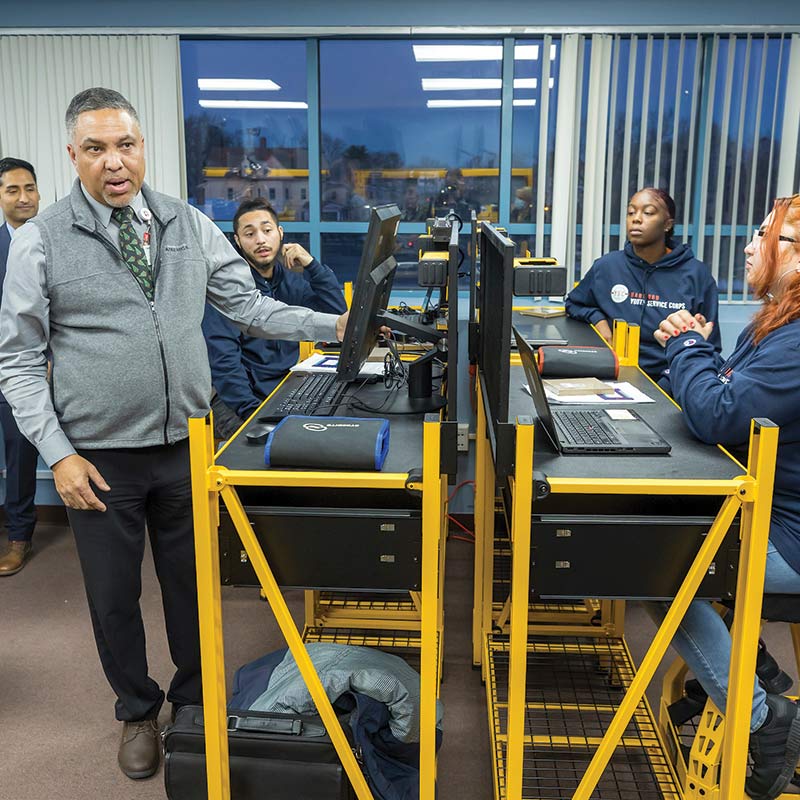
Growing up in Hartford’s housing projects in the 1960s and ‘70s, Bill Morin’s prospects may have been limited by his surroundings.
But, his single mom, a computer operator for United Technologies-Hamilton Standard during the height of the space program, ignited a spark that would propel him into technology leadership roles and mentorship.
Morin’s first interest was cooking, and culinary skills brought him to Hartford Hospital in 1991 for a cafeteria job. A self-described video-game and computer geek, he also volunteered to teach doctors to use Windows 95 and Office operating systems.
That work didn’t go unnoticed. When nurse Vicie Brooks needed tech support so a hospitalized patient could witness her son’s wedding, she knew just who to ask. Morin rigged a cart with a camera, speakers and Wi-Fi hotspot and the patient watched the vows from her hospital bed. His discretionary effort eventually led to a career in IT.
“Ms. Brooks always pushed me to get involved and was a great mentor to me,” Morin recalls of the retiree who continues to advocate for and mentor the next generation of healthcare professionals from traditionally underserved communities.
Motivated by Brooks and Greg Jones, HHC vice president of community health and engagement, Morin continued to advance. He also paid it forward, taking promising interns under his wing and teaching technology skills in programs such as the Boys and Girls Club of Hartford.
Brandon Murillo was one of those interns, learning to prepare, deliver and troubleshoot computers. Thanks in large part to his internship, Murillo now works at HHC, keeping computers running at 100 Pearl St.
Most recently, Morin helped launch Digital DividENDS, a partnership with Hartford HealthCare, Our Piece of the Pie, Hartford Youth Service Corps and the city to teach computer skills to young adults.
In addition to learning the ins and outs of computers, the students work on 150 decommissioned laptops donated by HHC as they become certified in PC repair. The laptops they refurbish will be donated to those in need, including first generation college students and the elderly. The youth have opportunities for summer internships at HHC, too.
“Programs that take a kid into a different area may open their eyes to new and different things,” says Morin of his hopes to expand participants’ understanding of potential career opportunities.
After 30 years at Hartford HealthCare, Morin is a field service analyst with the IT Department.
The relationships he’s built nurture him as much as he influences those he mentors. He will never forget how colleagues supported him when his mother tragically died in the 2003 Greenwood Health Center fire.
“If you have people that care about you and push you … you can do good work,” he says. “That’s the kind of good work I think that I have done and I’m trying to do.”
CRGs Enjoy Collaboration From the Very Top
In 2021, Hartford HealthCare created four colleague resource groups (CRGs) to help guide us on our journey toward diversity, equity, inclusion and belonging. The groups are made up of people of all levels and backgrounds across the system, each working with a dedicated member of the executive leadership team. We wanted to share a little about these executive sponsors, what motivated their engagement in these efforts and what they have learned so far along the way.
Meet Jeffrey Cohen, MD
Executive vice president and chief clinical operating officer
Executive sponsor: LGBTQ+ Colleague Resource Group
Why did you become the executive sponsor?
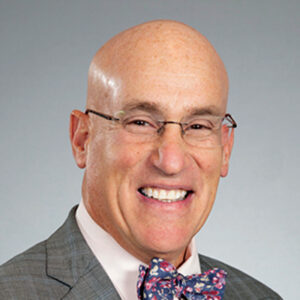 I am so committed to the journey we’re on as a system. I think a diverse workforce makes us a stronger, more successful organization and enhances our ability to make significant improvements in healthcare. We have not only aspirations, but also the obligation, to take care of everyone equally, and one way to do this is through the CRGs.
I am so committed to the journey we’re on as a system. I think a diverse workforce makes us a stronger, more successful organization and enhances our ability to make significant improvements in healthcare. We have not only aspirations, but also the obligation, to take care of everyone equally, and one way to do this is through the CRGs.
I chose the LGBTQ+ group for a few reasons. First of all, one of my daughters is gay and struggled through adolescence with her identity. Second,I grew up in New York City, and my mother, who was in the fashion industry, had a lot of friends who were gay, yet during that period of time many “remained in the closet.” Their journey and struggles had a significant impact on me. Lastly, early on in my career as a colorectal surgeon, I became known as “gay friendly” and a destination surgeon for the community.
What have you learned in this position?
I have learned:
- A reinforced respect for people.
- Not only is diversity to be celebrated, but we’re all more alike than different. We’re all people first with our challenges and celebrations.
- More obstacles and barriers exist for people who don’t come from the majority. For instance, I’ve learned a lot about transgender challenges and prejudice that are so pervasive in our society.
What are you proud of so far and or what are you looking forward to with the group?
Ours is a small but mighty team that has become unbelievably engaged in less than two years. I am proud to note that this group has tremendously raised awareness, both internally, as well as in the community, regarding LGBTQ+ issues through sponsoring programs and becoming progressively more visible. There was significantly less visibility before the CRGs were created.
I’m also looking forward to more organic growth for the group. It’s more challenging with this group because their belonging to this category is not as obvious as, for instance, it is for Asian American or Black colleagues, and therefore, difficult to recruit to. But, I look forward to growth on all campuses and ideas for projects that drive DEIB efforts.
—Susan McDonald
Meet Tracy Church
Executive vice president and chief administrative officer
Executive sponsor: Asian American Pacific Islander (AAPI) CRG
Why did you become the executive sponsor?
I am incredibly honored to serve as the sponsor for the AAPI CRG, and I do it to actively show my support for this critically important work.
What have you learned in this position?
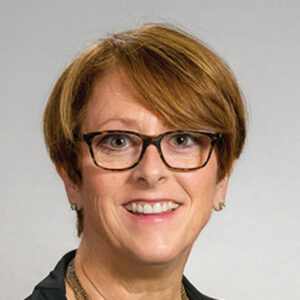 I have learned so much from this amazingly broad and diverse group of colleagues who, together, comprise the Asian American Pacific Islander CRG. In addition to spending time during each meeting learning about the many different subgroups within the AAPI CRG, I’ve especially enjoyed getting to know each of the members and hearing from them about their unique cultures, wonderful holidays and amazing heritages. We also spend time learning about the “Model Minority Myth” and biases our AAPI colleagues face, and ways to overcome them, while we build an environment of inclusion and belonging.
I have learned so much from this amazingly broad and diverse group of colleagues who, together, comprise the Asian American Pacific Islander CRG. In addition to spending time during each meeting learning about the many different subgroups within the AAPI CRG, I’ve especially enjoyed getting to know each of the members and hearing from them about their unique cultures, wonderful holidays and amazing heritages. We also spend time learning about the “Model Minority Myth” and biases our AAPI colleagues face, and ways to overcome them, while we build an environment of inclusion and belonging.
What are you proud of so far and/or what are you looking forward to with the group?
While there are many, one of the more recent moments of pride was having CRG Co-Chair Amina Weiland connect with Breakthrough Magnet School South to arrange for our CRG members to volunteer to read to the students — and then seeing the wonderful pictures of them sharing the stories and celebrating the Lunar New Year with the children.
Another proud moment is the work of the team to create and launch the learning module “What’s in a Name?” This interactive tool helps increase cultural awareness and respect by providing us with tips and techniques to help to pronounce people’s names correctly.
—Sebastian Trabucco
Meet Mike Daglio
Executive vice president and chief operating officer
Executive Sponsor: Hispanic Latinx Colleague Resource Group
Why did you become executive sponsor?
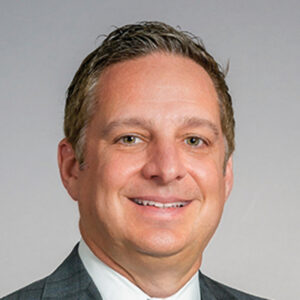 I came to Hartford HealthCare as St. Vincent’s Medical Center in Bridgeport was about to become part of our system. Leading that effort gave me an opportunity to see firsthand what we mean when we focus on “access.”
I came to Hartford HealthCare as St. Vincent’s Medical Center in Bridgeport was about to become part of our system. Leading that effort gave me an opportunity to see firsthand what we mean when we focus on “access.”
I love Hartford HealthCare’s ambition to create a more equitable culture for our colleagues of all backgrounds and identities. Being executive sponsor for our Hispanic Latinx Colleague Resource Group allows me to directly engage with the group’s passionate and creative members. I didn’t only want to support our continued journey for diversity and inclusion, I wanted to help lead it.
What have you learned in this position?
So much! This CRG continues to amaze me with the many ways they channel energy and enthusiasm into projects that have real impact — and get noticed. For example, I am delighted by the “Somos” (“We Are”) HHC campaign the CRG created. This video and social media series included Hispanic/ Latinx clinicians and colleagues introducing themselves as proud members of the HHC community. It promoted HHC’s greatest strengths and points of differentiation: our people, and our collective commitment to diversity and inclusion.
What are you proud of so far, and what are you looking forward to with the group?
I think of how the CRG brings system-wide attention to Hispanic Heritage Month with great intranet content, the inclusion of culturally authentic dishes in hospital cafeterias, and sharing key Spanish words and phrases, plus celebrating countries with engaging content. I’m proud of how the CRG uses all the tools HHC makes available to create awareness and display pride in who they are and what we do together. But what I am most proud of are the people who have joined this CRG. They have created a “safe environment” for each other. They care for each other. They share venerable stories about their experiences, and encourage others to do the same, so that we can learn how to be better as a large organization serving so many unique individuals.
I see only more great things ahead, as the CRG further connects with patient education and translation services, builds a translated clinical library for patients, and partners with HHC career coaches and mentors. It’s amazing.
—Keith Fontaine
Meet C. Okey Agba
Executive vice president and chief financial officer
Executive sponsor: Black and African American Colleague Recourse Group
Why did you become the executive sponsor?
I was introduced to the CRGs during an executive leadership meeting. Shortly after, I was nominated as executive sponsor for the Black and African American CRG. I also felt a calling to do so. I knew if I was not in a leadership role, I would still be an active member of the group.
What have you learned in this position?
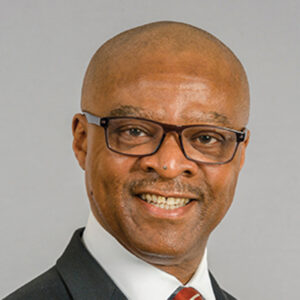 During my short but significant time with Hartford HealthCare, I have noticed greatness across the system, such as:
During my short but significant time with Hartford HealthCare, I have noticed greatness across the system, such as:
- Respect for diversity and inclusion.
- Respect of the workforce and how it reflects the people we serve and the state we live in.
- How we empower people inside and outside the organization to always do the right thing.
What are you proud of so far and/or what are you looking forward to with the group?
I want the CRG members to be engaged and excited. I am excited and passionate, taking on any task that may come my way. I believe that if you are passionate about what you do, you will be successful. I look forward to meeting, planning and executing goals as a team.
